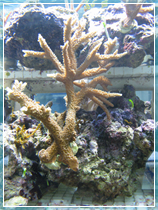24 December 2010
Exciting new era for coral research
Colchester Campus

An exciting new era of research has begun at the University’s Coral Reef Research Unit.
Its new tropical research aquarium facility is now up and running, and will greatly enhance the diversity of research undertaken at Essex.
The £50,000 aquarium doubles up as a research facility and a coral husbandry facility, taking away the need to buy coral for experiments and enabling the research unit to address key research questions under controlled laboratory conditions.
It is unique in terms of its experimental chambers where different environments can be created and will showcase the world-class coral research being carried out at the University.
Dr Dave Smith and Dr David Suggett from the Coral Reef Research Unit are featured in a podcast on National Environment Research Council's website PlanetEarth online
Dr Dave Smith, Director of the Unit, said: “We now have total control over coral growth conditions and this will enable us to answer key questions from the molecular to the ecosystem level. It is a new era of research for us and UK coral science.
“The diverse research opportunities that the new facility provides will enable us to competitively bid across a wider range of income streams and will also strengthen existing collaborative programmes.”
Projects currently being carried out at the aquarium include research funded by NERC (Natural Environment Research Council) into how different environments affect coral mortality.
A second project, funded by Mitsubishi’s global coral taskforce initiative, is to better understand how the structure of a reef varies by climate change.
Explained Dr Smith. “It is very important to determine how reefs will most likely respond to climate change, how fundamental changes will influences coral reef diversity and productivity and therefore the effects of climate change on the numerous ecosystem services provided by reefs to the half a billion dependants globally.
“It is all about linking the biological implications with the social implications and ensuring that the Unit’s research activities have maximum impact.”
...more news releases